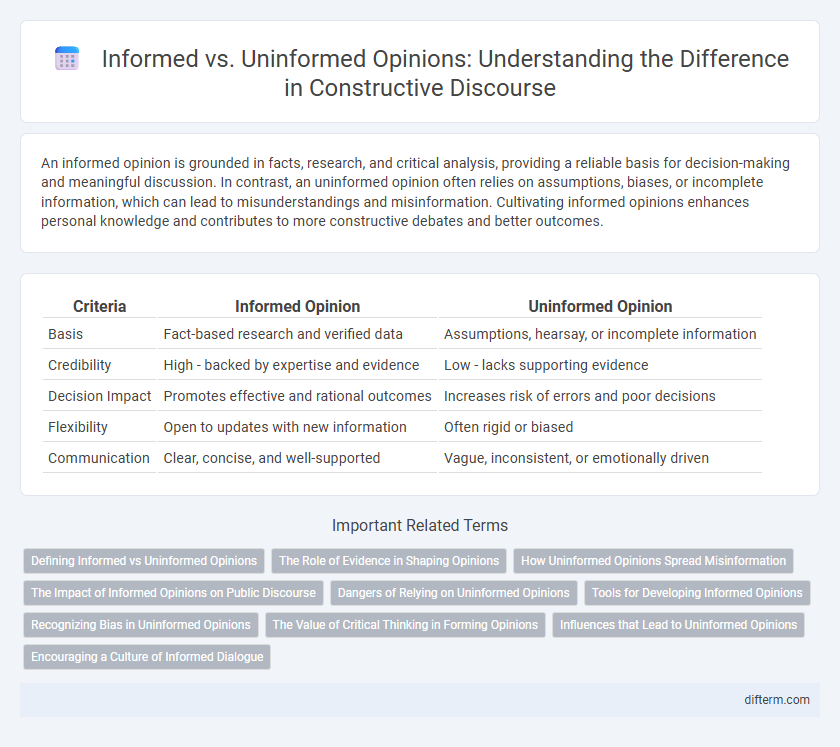An informed opinion is grounded in facts, research, and critical analysis, providing a reliable basis for decision-making and meaningful discussion. In contrast, an uninformed opinion often relies on assumptions, biases, or incomplete information, which can lead to misunderstandings and misinformation. Cultivating informed opinions enhances personal knowledge and contributes to more constructive debates and better outcomes.
Table of Comparison
| Criteria | Informed Opinion | Uninformed Opinion |
|---|---|---|
| Basis | Fact-based research and verified data | Assumptions, hearsay, or incomplete information |
| Credibility | High - backed by expertise and evidence | Low - lacks supporting evidence |
| Decision Impact | Promotes effective and rational outcomes | Increases risk of errors and poor decisions |
| Flexibility | Open to updates with new information | Often rigid or biased |
| Communication | Clear, concise, and well-supported | Vague, inconsistent, or emotionally driven |
Defining Informed vs Uninformed Opinions
Informed opinions are grounded in accurate knowledge, critical thinking, and relevant evidence, enabling individuals to make reasoned judgments. Uninformed opinions, lacking factual basis and critical evaluation, often stem from assumptions, biases, or misinformation. Distinguishing between these types of opinions is essential for constructive dialogue and effective decision-making.
The Role of Evidence in Shaping Opinions
Evidence serves as the foundation for informed opinions by providing factual accuracy and credibility. Opinions grounded in reliable data foster critical thinking and constructive dialogue. Without evidence, opinions risk being biased, speculative, and misleading.
How Uninformed Opinions Spread Misinformation
Uninformed opinions frequently contribute to the rapid spread of misinformation by lacking a factual basis and increasing the circulation of false or misleading content. Social media platforms amplify these opinions through algorithm-driven echoes, causing users to encounter and believe inaccuracies without critical analysis. This phenomenon undermines public understanding and distorts discussions on important societal issues.
The Impact of Informed Opinions on Public Discourse
Informed opinions, grounded in accurate data and critical analysis, significantly elevate public discourse by fostering rational debate and well-founded decision-making. They empower individuals to challenge misinformation, encourage transparency, and contribute to democratic processes with evidence-based perspectives. The prevalence of informed opinions leads to more constructive conversations that drive social progress and policy development.
Dangers of Relying on Uninformed Opinions
Uninformed opinions often lack factual accuracy, leading to the spread of misinformation that can skew public perception and decision-making. Relying on such opinions in critical matters increases the risk of poor choices, undermining social, political, and economic stability. An informed opinion, grounded in evidence and critical analysis, promotes constructive dialogue and well-founded conclusions essential for progress.
Tools for Developing Informed Opinions
Access to reliable sources such as academic journals, expert interviews, and verified data repositories is crucial for developing informed opinions. Critical thinking skills combined with digital literacy enable individuals to evaluate the credibility of information and distinguish facts from misinformation. Utilizing fact-checking platforms and engaging with diverse perspectives strengthen the foundation for well-informed viewpoints.
Recognizing Bias in Uninformed Opinions
Uninformed opinions often stem from biased perceptions shaped by limited information or personal prejudices, leading to distorted views that lack critical evaluation. Recognizing this bias requires questioning the sources and motivations behind judgments and seeking diverse perspectives to counteract echo chambers. Informed opinions emerge by analyzing evidence rigorously, enabling more balanced and accurate conclusions.
The Value of Critical Thinking in Forming Opinions
Critical thinking empowers individuals to evaluate evidence and identify biases, enhancing the accuracy of their opinions. Informed opinions stem from careful analysis of credible information, leading to more effective decision-making and meaningful dialogue. Uninformed opinions often rely on assumptions or misinformation, which can perpetuate misunderstandings and hinder constructive progress.
Influences that Lead to Uninformed Opinions
Uninformed opinions often stem from exposure to biased or incomplete information sources, such as social media echo chambers and sensationalist news outlets. Cognitive biases, including confirmation bias and groupthink, further distort perception and hinder critical evaluation of facts. Lack of subject-matter knowledge or failure to verify information contributes significantly to the formation of illogical or misled viewpoints.
Encouraging a Culture of Informed Dialogue
Promoting a culture of informed dialogue fosters critical thinking and enhances decision-making by prioritizing evidence-based perspectives over uninformed opinions. Encouraging individuals to seek credible sources and engage in respectful exchanges cultivates mutual understanding and reduces misinformation. Communities committed to informed discourse experience more productive debates and stronger social cohesion.
informed opinion vs uninformed opinion Infographic

 difterm.com
difterm.com